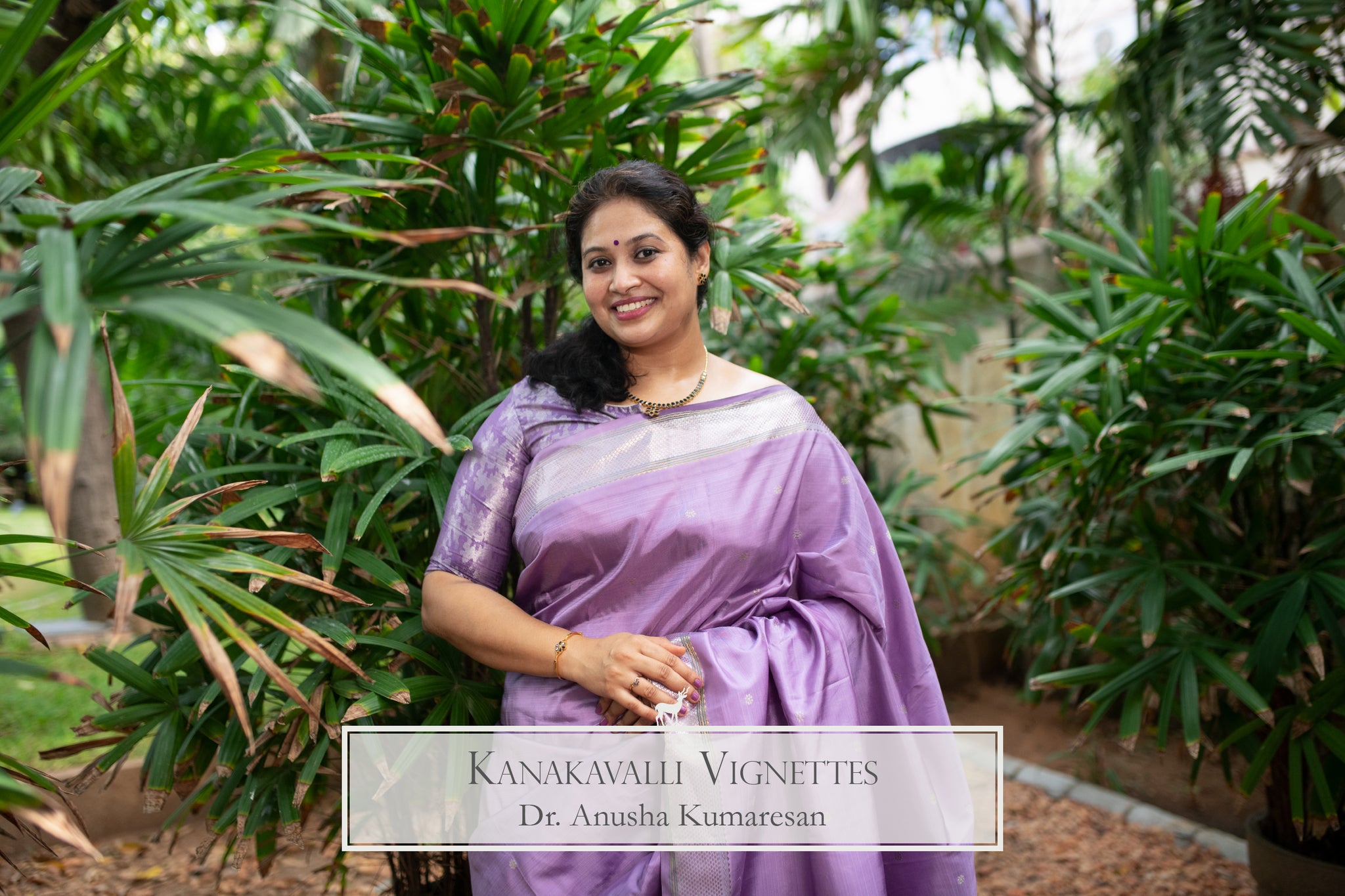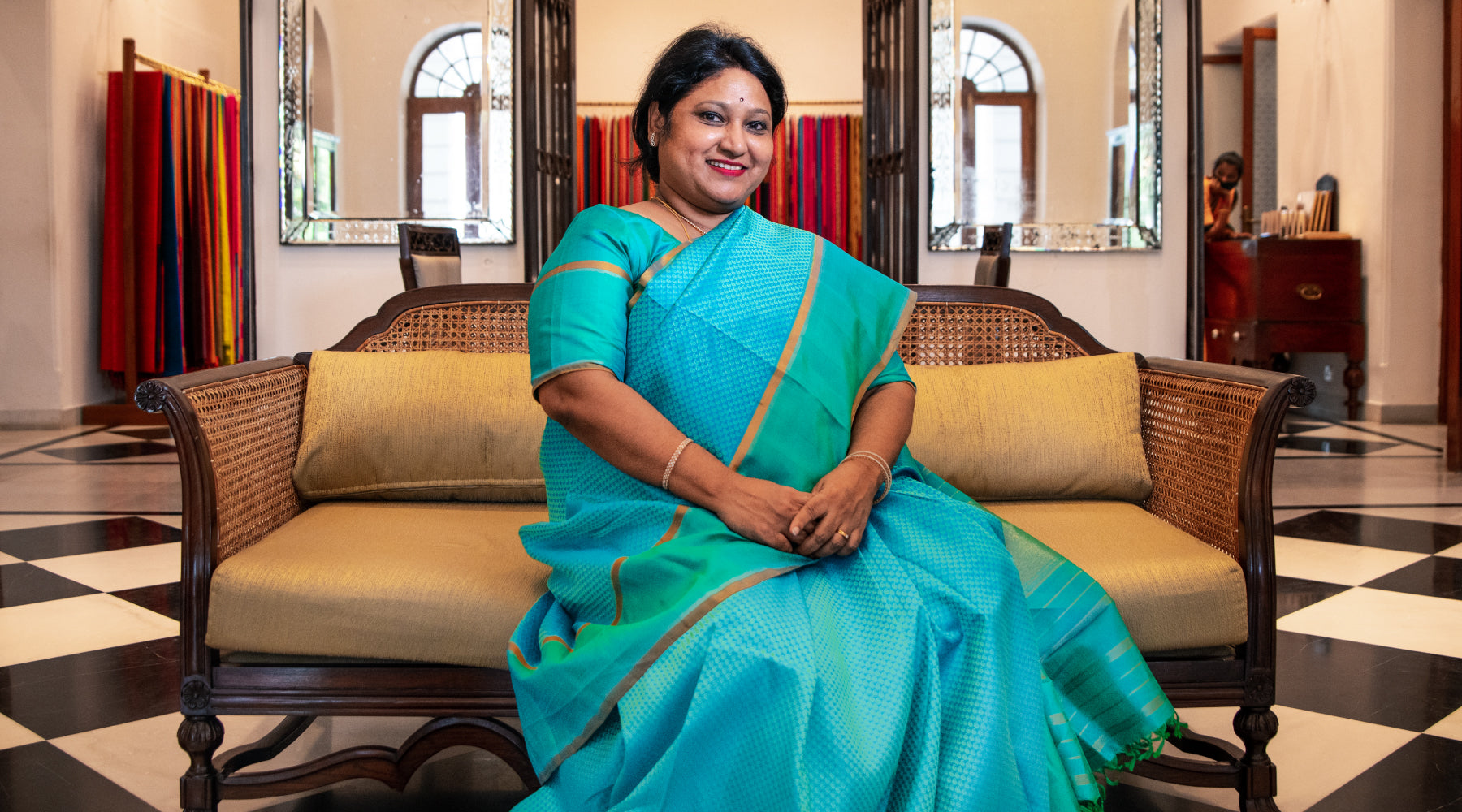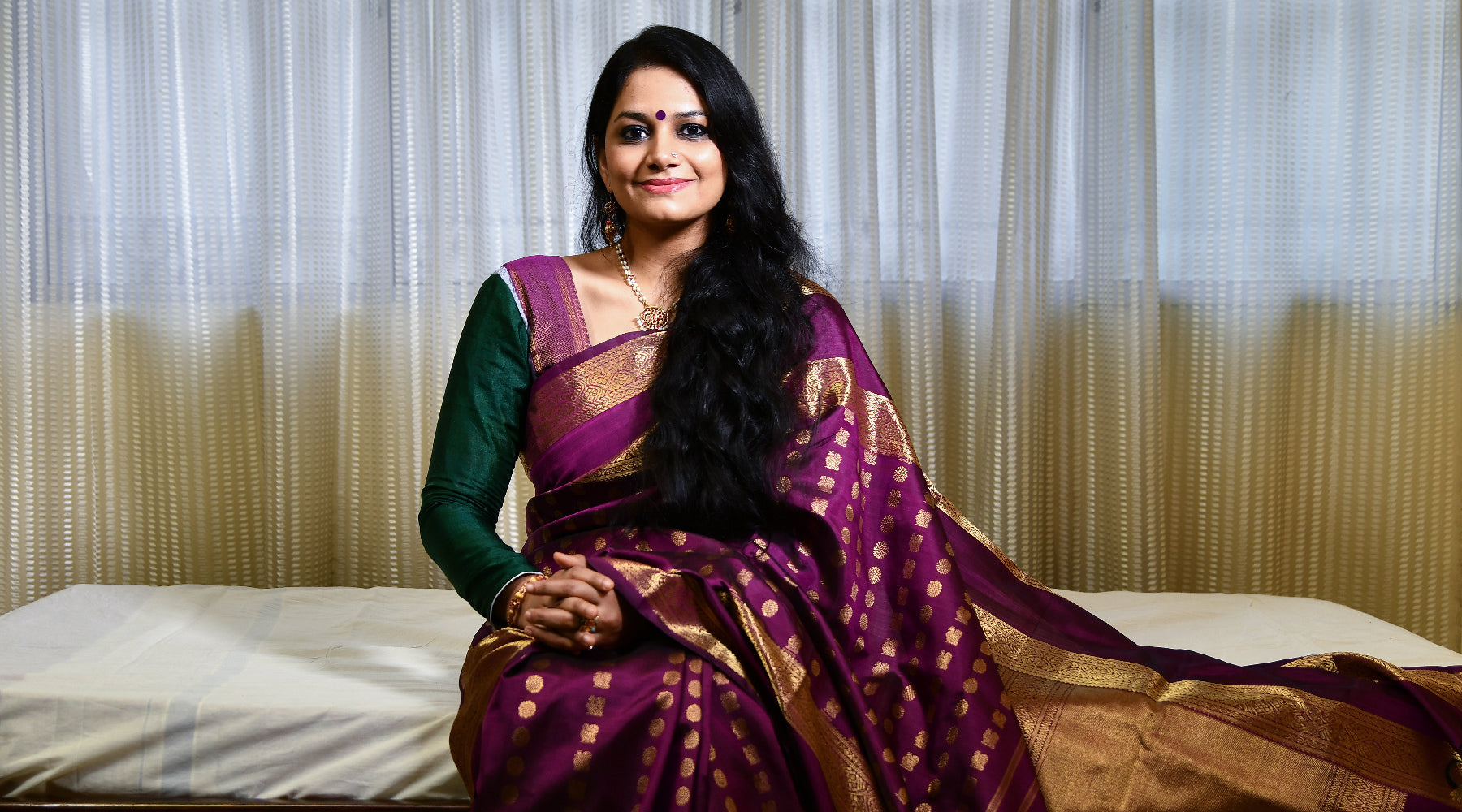KANAKAVALLI VIGNETTES : Dr. Anusha Kumaresan - Love and Understanding

Kanakavalli’s August Vignette Dr. Anusha Kumaresan is a food scientist, who finds beauty in the ordinary. Living with a speech impediment, Dr. Anusha’s journey to self-acceptance has been a long one, but has helped her find joy in being exactly who she is. In this conversation with Aneesha Bangera for The Kanakavalli Journal, Dr. Anusha opens up about going from being a lively child to a withdrawn young adult struggling with feelings of inferiority. As an adult, though, she discovered the power of positivity and acceptance, and is determined to bring love and happiness everywhere she goes. Finding solace in cooking and in colour, Dr. Anusha enjoys spending time with her plants and in embarking on craft projects involving crochet and embroidery. Dr. Anusha believes that if you seek beauty you will find it, and for her, the sari is the most beautiful garment. Browsing through the Kanakavalli repertoire, Dr. Anusha curates a selection of kanjivarams that reflect her love for colour and weave. Excerpts from the conversation below…
Love And Understanding
The ups and downs of childhood
My mother tells me that I was a very friendly child, and even at the age of one or two, would happily befriend strangers. I was lively and affectionate, and always up to some sort of mischief; quite the opposite of my calm and quiet brother.

Above: Dr. Anusha spent a memorable few years living in her grandparents' beautiful home in Nagercoil, built in the 1930s.
One of the most memorable periods of my childhood is the time I spent in my grandparents’ beautiful home in Nagercoil that was built in the 1930s. We lived there for two or three years while my father was away in Saudi for work. It was a sprawling house, with a rice mill nearby, and it was a wonderful place to grow up. My grandmother had a great influence on me as a child, and we still share a very close relationship.

Above: Dr. Anusha's grandmother, with whom she shares a very special relationship, photographed years ago and more recently.
The first time I realised that I had a speech impediment was when I was in the fifth grade. I remember my teacher asking me what my name was on the first day of school, and I was just unable to say it. Soon, I was the butt of jokes and pranks in school and I felt like the odd one out. Gradually, the outgoing, outspoken child I’d been disappeared, and I grew quiet, and began to feel as though I were somehow inferior. However, I made sure not to lag behind in class by working and applying myself extra hard. As I grew up, I began to enjoy myself and open up a bit more, but it was when I was doing my Master’s degree that I finally came to terms with and accepted who I was, and rediscovered my true nature—the real Anusha.
For the love of food
When I was seven or eight years old, I would spend weekends in the kitchen rolling balls of dough for my brother to make rotis with. My aunt used to bake cakes, and when I was ten or eleven years old I began to help her. At first, she’d give me the easier tasks—beating eggs or sifting flour. I think my real passion for cooking began the day I baked my first chocolate cake—that is something I’ll never forget.

Above (left to right): Dr. Anusha with her mother; With her parents and brother; As a child, Dr. Anusha would have to be given a snack if her parents wanted her to pose for a photograph!
My biggest influence when it comes to cooking, though, is my grandmother, who taught me almost everything I know. She is from Trivandrum and I learnt how to cook many traditional dishes from Kerala from her. For Deepavali, my grandmother and I would work together to make rava ladoos and other snacks. Cooking with my grandmother is a memory I’ll always cherish.
I think a love for food is in my genes. My mother, grandmother and aunts are all amazing cooks. They always created simple but really tasty meals, pairing dishes that perfectly complemented each other. I began to experiment on my own, trying new recipes and combinations. I always relied on the traditional flavours that I learnt from my family, but tried to add my own touch. I have lived in the US, Israel and Abu Dhabi, and I draw from all these cuisines. I enjoy making Middle Eastern, Mexican, Italian and, of course, Indian food.
I am the kind of person who finds beauty in everything—from the peeling of a fruit to the shapes that a cloud takes. Beauty does not have to be about the extraordinary, and I see it in everyday things, particularly in food and the cooking process. I’ve always deeply appreciated my mother’s food, and she says that she loves cooking for me because of this.
Studying Food & Nutrition Science was a happy accident. I loved chemistry, and I loved food and this course brought these things together. After I got married, I was a homemaker until I had my son. After he was born, I went on to do my PhD in Nutritional Science, specialising in sports nutrition. I currently work with a reputed research organisation. When I cook for my family I pay a great deal of attention to the quality of the food and ingredients, making sure that the flavours and combinations balance each other well.
The journey to acceptance
In school and college, I realised that I could learn things very quickly in my mind without ever having to say a word. I felt as though speaking might slow me down, so I did everything in my head, not realising that reading aloud was actually a form of speech therapy.

Above (left to right): Always a foodie, a young Dr. Anusha clutches a handful of biscuits as she poses for a photograph; All dressed up in a kanjivaram sari as a child; Dr. Anusha wearing a Kanakavalli favourite.
It was while attending competitive interviews that I realised I had to work extra hard to prove myself. I felt I had to put in more effort and hard work to compete for the same opportunities. This meant that I was constantly upgrading my skills and doing supplementary courses—something I continue to enjoy doing even today. On paper, I wanted to be the most impressive candidate. It might be slightly harder for me to get jobs, but I think when people get to know me and see my work ethic, they realise I’m just as capable.
For the longest time, I felt as though I was lacking in some way. However, my experiences have now taught me to accept myself for who I am. I always bring a positive attitude to everything I do, and I truly believe we are born to find happiness and bring happiness to others. I don’t feel the need to prove myself; I know what I’m capable of, and if someone does not give me a chance, then I just move on from there. I have realised that it’s okay to be imperfect. Humans come in all shapes and size—some are short, some are tall, some are fluent, and some are not—and there is beauty in that.

This attitude has brought me so much clarity. I’ve realised that instead of focusing on what we don’t have and feeling miserable about it, it’s important to focus on everything that we do have. We need to accept ourselves with all our flaws and failures, rather than constantly finding fault with ourselves. Learning that it’s okay to be imperfect has been a long journey for me, but it has transformed me.
Finding balance
I’ve always believed that when you’re managing multiple roles, you can’t give yourself fully to every single one of them. This might be a controversial idea, because I know many people who feel able to give a hundred percent focus and commitment to everything they do. This is wonderful, but personally, as a woman trying to balance motherhood, a career, and my own well-being, I think it’s okay if I’m giving each role 80% of my energy. Sometimes, 80% is good enough, especially when you’re doing your best. As working women, many of us put too much pressure on ourselves, but it’s okay to make some compromises now and then. When we expect too much of ourselves, we could end up compromising on our own health—skipping meals, not getting enough sleep. I know I do most of my getting ready on my commute to work and barely sleep six hours a night!

Above (left to right): Dr. Anusha with her husband and son; Wearing a Kanakavalli kanjivaram from the Molten collection, and posing with her husband.
I’m a mother and a wife, I have a career and I also cook and clean my home. But I think what’s most important is making time for myself—whether it’s to have an occasional oil massage, or do an online course to upgrade my skills. I think if we do things to bring happiness to others, but also do little things for ourselves, we can find a balance in our lives.
Colours to heal
I love colour—it is my biggest stress reliever. I truly believe that the colours on a plate of food are a treat for the eyes, while the soothing colours of a scenic landscape can ease the mind. My first hobby was gardening. As a child, my father set up a little space where I grew flowering plants and vegetables. I was fascinated watching a seed grow into a plant. Wherever I have lived, whether in a hostel room, or in my small apartment, I have made sure to create a green space.

Above: Dr. Anusha finds solace and beauty in green spaces, and has filled her home and balcony with plants that bring her joy.
My love for colour goes hand in hand with my love for crafts. My mother is a crafts teacher, and my grandmother did a lot of crocheting, so I think I inherited this from them. Years ago, my grandmother crocheted this lovely bag with a secret pouch that I still have. I absolutely love to create things—I believe that the arts are an amazing way to express oneself, to tell stories. I do a lot of embroidery and crochet. My idea of retail therapy is to go to a crafts store and buy yarn and thread and lots of other supplies in a range of colours.
Life lessons
My father always told me that if you give love, you will receive love. He taught us to shower love on people even if they hurt (H) us or expressed hate (H). In fact, he used to have an equation for this: ‘L is inversely proportional to H and H’! This is something I always keep in mind, no matter where I go or who I meet. The other greatest lesson I have learnt is acceptance. Letting go of expectation and accepting all our imperfections can bring a deep sense of peace.
If there’s one thing the current pandemic has taught us it’s that nothing is permanent, and there is very little within our control. We have been forced to accept the situation, and to change our ways to adapt.
If we bring love, find acceptance, and accept change, then I think we will be well-equipped to face our lives in the best way possible.
On beauty and tradition
I believe that beauty lies in the eyes of the beholder. I think that we are capable of seeing beauty all around us, if only we try. If you seek beauty, you will find it.
Tradition is what helps me understand who I am; it is my identity. People in every part of the world have developed and imbibed their own unique cultural roots—and I think it is our duty to carry these forward. While’s it’s important to pass on the value of our traditions, I also think it’s valuable to enhance and adapt these for the current times.
On the sari
I think the sari is the most beautiful and versatile garment. It suits every woman, no matter her shape or size. I think it enhances a woman’s natural beauty. The sari is my go-to outfit. I love pure cottons, and I absolutely love kanjivarams. I think they are the most beautiful silk saris. I love the softness of the silk, and the comfort of the drape.
I think Kanakavalli has the finest quality when it comes to kanjivarams, and if I’m honest, I must admit that I’m addicted to their saris. My husband jokes that I should change my name from Anusha to Anushkavalli! I think I’d be able to identify a Kanakavalli sari even if I were blindfolded, just by the feel of the silk. My favourite Kanakavalli collection is the Vault—I am in awe of the skill of the master weavers. My favourite motifs are the ancient mythical creatures, particularly the yali.
I don’t need an occasion as an excuse to shop at Kanakavalli, and love to go to the store anytime I can. I fell in love with this gorgeous kanjivaram, in one of my favourite colours, the moment I saw it. In fact, I love this sari so much that I have it in two different shades!

Dr. Anusha is wearing a Kanakavalli kanjivaram in lavender shot with pale grey and dotted with floral buttis in silver zari. The border features geometric patterns in silver and gold zari with hints of green, while peacocks adorn the pallu.
- Dr. Anusha Kumaresan, in conversation with Aneesha Bangera, photography by Raghuram Vedant.
View Anusha's accompanying guest curation here.



